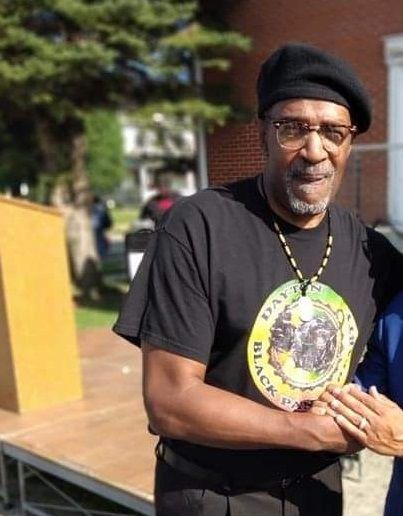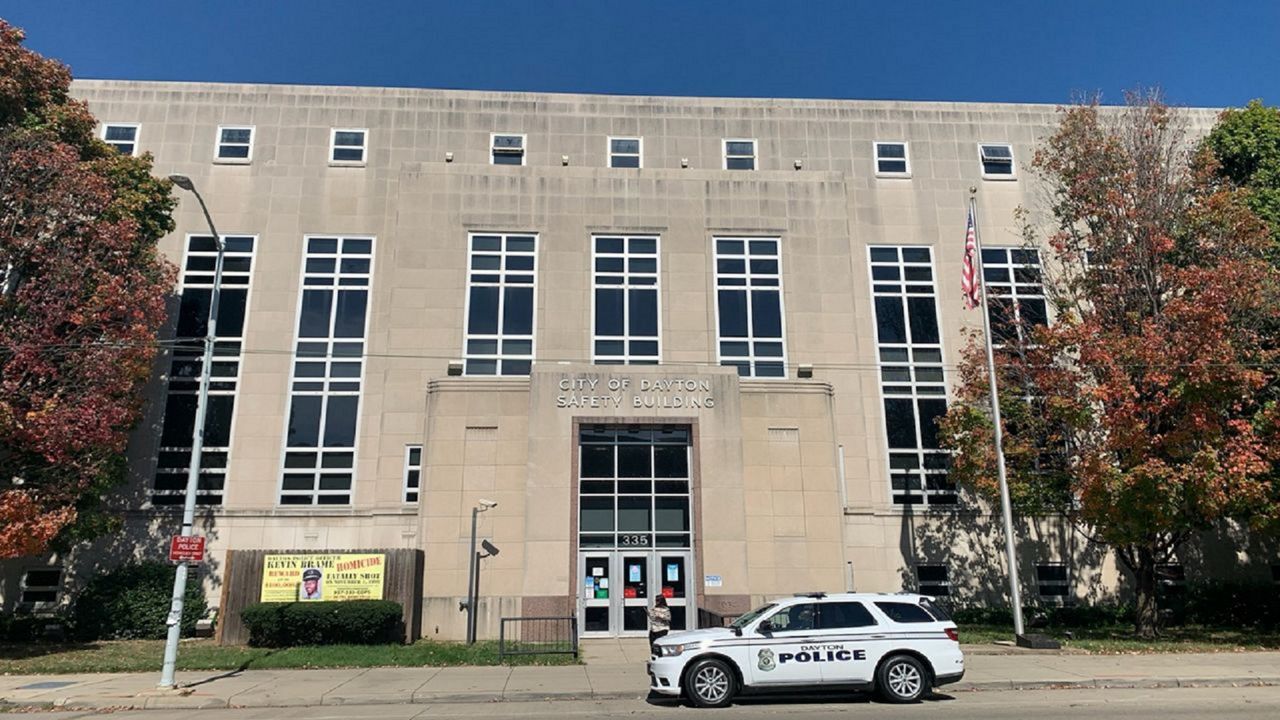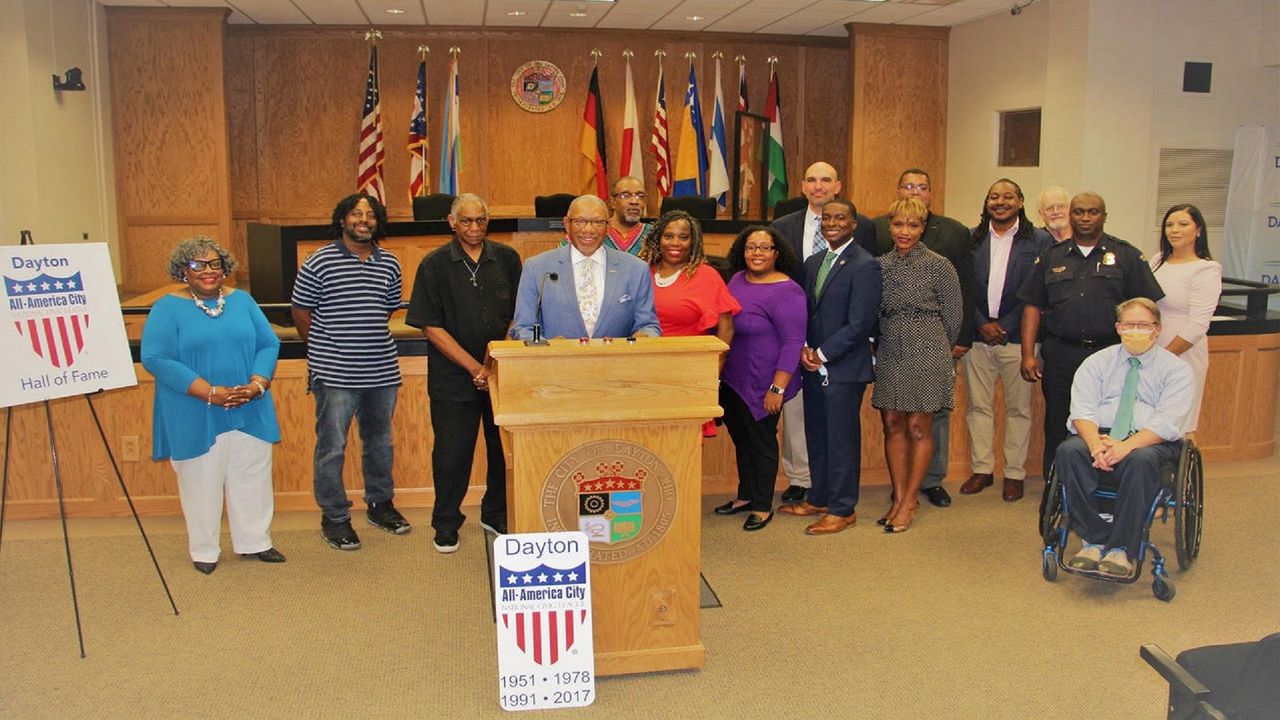DAYTON, Ohio – The City of Dayton earned national recognition for the community engagement strategies it used as part of an ongoing, multi-year police reform process.
What You Need To Know
- Dayton is set to become the fifth city inducted into the National Civic League Hall of Fame
- The honor for the Gem City is due largely to its recent resident-led work on police reforms
- More than 100 community members spent parts of 2020 and 2021 coming up with more than 140 recommendations for police reforms
- About 100 of the reforms are in place in some capacity
Officials from Dayton announced Tuesday afternoon it had earned a spot in the National Civic League Hall of Fame. The honor goes to former All-America City award recipients that have supported community-driven initiatives that result in a significant local impact.
Formed in 1894, the National Civic League supports and recognizes cities for municipal reform and general excellence.
In its history, Dayton has earned the All-America City designation four times — 1951, 1978, 1991 and 2017. The city shared its most recent prize, in 2017, with Montgomery County for notable improvements in student success, including school attendance and summer learning.
Dayton is the fifth inductee since the creation of the hall of fame in 2019.
“We are happy to welcome Dayton into the Hall of Fame,” said Doug Linkhart, president of National Civic League. “The recent police reform initiative shows that the community is still embodying the ideals of an All-American City and is committed to the practice of civic engagement.”
Residents lead way from protests to police reform
Dayton’s march toward police reform started in mid-2020 following the death of George Floyd in Minnesota. It led to calls for improvements in law enforcement and police departments’ engagement with residents across the nation. The Gem City was no different.
In response, residents of Dayton joined forces with City Hall to assemble a group of more than 100 volunteers — community leaders, legal experts, civil rights advocates, elected officials and representatives from the Dayton Police Department.
In its selection announcement, the National Civic League described Dayton’s recruitment approach as “bottom-up” rather than “top-down.”
“As opposed to relying on the same pool of community members that have been at engagement tables over the past couple decades, the city actively recruited people who were critics or had never been at the table before,” the organization’s statement reads.

The five working groups met between June 2020 and April 2021 and came up with a list of 142 recommendations. Measures included policies and practices related to oversight, training, community engagement, use of force, and recruitment of officers.
The process also “heavily impacted” racial equity goals for other community boards, city staffing, and decision-making bodies, the National Civic League wrote.
Donald Domineck, 61, was a member of the Use of Force Working Group. A Black man, he admitted to being “skeptical” about the process at first.
A leader of the Dayton chapter of the Black Panther Party, he helped organize rallies over the deaths of Floyd, Breonna Taylor, Elijah McClain, and other Black people killed in interactions with police. Former Mayor Nan Whaley invited Domineck to take part in the reform process.
At first, the group “bumped heads,” Domineck said. He knew several of the police officers involved from growing up in Dayton. He called those early meetings contentious.
“There was a lot of disagreement on different things, and people weren’t really seeing eye-to-eye,” the West Dayton resident added. “But after we met a few times, it balanced out.”
Having a diverse mix of races, sexualities, political perspectives and socioeconomic backgrounds in the room made it so people “had to look at the humanity in each other” rather than focusing on their differences, Domineck said.
Domineck credited Dayton Mayor Jeffrey J. Mims, Jr., then a city commissioner, with being a leader throughout the process.
“We still had some tense moments and some areas where we didn’t agree on, but I just was really impressed by the process,” Domineck said. “For the most part, we managed to work through most of the recommendations we made.”
The Dayton City Commission reviewed and approved most of the recommendations in 2021. The implementation roll out began shortly thereafter.
“By utilizing several diverse community voices and partners, we reimagined what community engagement in policing looks like,” said Mims, who thanked the National Civic League for its praise. “There is still more work to do, but this process has already resulted in positive outcomes.”
From recommendation to real change
While Dayton has received praise for its police reform process, the work to implement those recommendations is ongoing.
As of Wednesday, 100 of those are complete or partially implemented, according to a performance dashboard populated and operated by the city.
One of those improvements was the creation of a Mediation Response Unit, a collection of unarmed, non-police employees trained in conflict resolution. In its first three months, the MRU team responded to more than 400 nonviolent calls for service.

There are 22 recommendations listed as “in progress” on the dashboard. There are 20 listed as being delayed for reasons ranging from the City Commission still performing fact-finding to other actions needing to take place before implementation.
Following the release of the recommendations, the City of Dayton assembled a handful of working group members to create an oversight committee. The stated goal was to ensure the city continued to make progress rolling out the reforms.
That committee “sunsetted” or came to an end in late 2021. In its place, the city created six permanent citizen-led boards in December to provide regular improvement feedback on police policy.
The City Administrator appoints four of the groups, while the other two receive appointments from the City Commission. It’s the job of each group to provide updates and reports to the city and report out to the community as well.
Having the members appointed to a formal city board makes it easier for City Commissioners to take action on their feedback, according to a city spokesperson.
On Wednesday, the city administration provided an update on the reform process to City Commission during a work session.
“I'm pleased with the progress Dayton Police and the entire city organization have been able to make in implementing the community's recommendations brought forward during the police reform process,” City Manager Shelley Dickstein said. “The effort is ongoing, but we're already seeing significant and meaningful outcomes from this work.”
Domineck, a member of the new Use of Force Committee, said the work is going “pretty good so far” despite a “few snags in the road.”
One current sticking point, he said, is a debate over the updating of a policy related to escalation of force in certain situations. The group planned to meet to hammer out those and other details Thursday, Domineck said.
While it’s still early, Domineck said he’s already seen positive changes in how DPD officers are policing his neighborhood. He’d like to see more diversity among the police ranks, he said, but he appreciates the city for taking the reform process seriously.
“There are some stubborn people out there who won’t want to change, but I am seeing changes,” he said. “I’m hopeful, man, that we’re going to make some headway. And if we don’t, we’re going to hold them accountable.”



